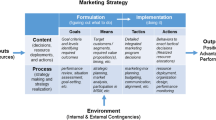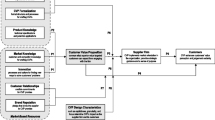Abstract
There has been an increase in number of skeptical consumers who do not trust the actions of the marketers. Cause related marketing (CRM) is primarily being used by companies to position themselves on a social platform to develop a positive image in the mind of their customers. It is being increasingly used in several countries to build long term relation between the company and the consumer. The growth of CRM is not restricted to developed countries but has been gaining increased attention in several emerging countries. Knowledge and awareness are necessary ingredients to increase effectiveness of CRM, lack of which may result in consumer skepticism. This study explores consumer awareness and skepticism towards CRM which so far has received little attention from researchers. Statistical analysis was employed to examine the role of socio-demographic variables on both these variables. Data was collected through a survey of 500 consumers from five cites. The findings suggest that higher awareness could lead to higher skepticism. Younger consumers and females were found to less skeptical about CRM. Important implications for researchers are drawn in this study in the area of consumer skepticism towards CRM pertaining to emerging markets like India.
Similar content being viewed by others
References
Antonides, G., & Van Raaij, W. F. (1998). Consumer behaviour: A European perspective. John Wiley.
Anuar, M. M., & Mohamad, O. (2012). Effects of skepticism on consumer response toward cause-related marketing in Malaysia. International Business Research, 5(9), 98.
Barnes, N. G. (1992). Determinants of consumer participation in cause-related marketing campaigns. American Business Review, 10(2), 21–24.
Berglind, M., & Nakata, C. (2005). Cause-related marketing: More buck than bang? Business Horizons, 48(5), 443–453.
Bhattacharya, C. B., & Sen, S. (2004). Doing better at doing good: When, why and how consumers respond to corporate social initiatives. California Management Review, 47(1), 9–24.
Chaney, I., & Dolli, N. (2001). Cause related marketing in New Zealand. International Journal of Nonprofit and Voluntary Sector Marketing, 6(2), 156–163.
Chang, C. T., & Cheng, Z. H. (2015). Tugging on heartstrings: Shopping orientation, mindset, and consumer responses to cause-related marketing. Journal of Business Ethics, 127(2), 337–350.
Chang, C.-T., & Liu, H.-W. (2012). Goodwill hunting? Influences of product-cause fit, product type, and donation level in cause-related marketing. Marketing Intelligence & Planning, 30(6), 634–652.
Chapple, W., & Moon, J. (2005). Corporate social responsibility (CSR) in Asia: A seven country study of CSR website reporting. Business and Society, 44(4), 415–441.
Corbishley, K. M. (2007). Consumer behaviour towards cause related marketing in the greater eThekweni region. (doctoral dissertation) University of Technology, Durban, Republic Of South Africa.
Cui, Y., Trent, E. S., Sullivan, P. M., & Matiru, G. N. (2003). Cause-related marketing: How generation Y responds. International Journal of Retail & Distribution Management, 31(6), 310–320.
DaSilva, A. (2004). The 2004 cone corporate citizenship study. Boston, MA: Cone Communications.
Economic Times (2017). In India, television still remains an important medium for advertisers. Available at https://economictimes.indiatimes.com/industry/media/entertainment/media/in-india-television-still-remains-an-important-medium-for-advertisers/articleshow/58623086.cms?from=mdr.
Elving, W. J. (2013). Scepticism and corporate social responsibility communications: The influence of fit and reputation. Journal of Marketing Communications, 19(4), 277–292.
Forehand, M. R., & Grier, S. (2003). When is honesty the best policy? The effect of stated company intent on consumer skepticism. Journal of Consumer Psychology, 13(3), 349–356.
Fries, A. J., Gedenk, K., & Völckner, F. (2009). Success drivers of cause related marketing. In In proceedings of the European marketing academy conference EMAC 2009. Nantes: Frankreich.
Galan Ladero, M. M., Galera Casquet, C., & Singh, J. (2015). Understanding factors influencing consumer attitudes toward cause-related marketing. International Journal of Nonprofit and Voluntary Sector Marketing, 20(1), 52–70.
Gupta, S., & Pirsch, J. (2006). A taxonomy of cause-related marketing research: Current findings and future research directions. Journal of Nonprofit & Public Sector Marketing, 15(1–2), 25–43.
Hibbert, S., Smith, A., Davies, A., & Ireland, F. (2007). Guilt-appeals: Persuasion knowledge and charitable giving. Psychology and Marketing, 24(8), 723–742.
Kureshi, S., & Thomas, S. (2016). A study of cause related marketing initiatives and consumer insights: Evidences from the Indian context. South Asian Journal of Management, 23(2), 109.
Kureshi, S., & Thomas, S. (2018). Testing the influence of message framing, donation magnitude, and product category in a cause-related marketing context. Journal of Marketing Communications, 1-22.
La Ferle, C., Kuber, G., & Edwards, S. M. (2013). Factors impacting responses to cause-related marketing in India and the United States: Novelty, altruistic motives, and company origin. Journal of Business Research, 66(3), 364–373.
Lavack, A. M., & Kropp, F. (2003). A cross-cultural comparison of consumer attitudes toward cause-related marketing. Social Marketing Quarterly, 9(2), 3–16.
Maignan, I., & Ferrell, O. C. (2001). Corporate citizenship as a marketing instrument-concepts, evidence and research directions. European Journal of Marketing, 35(3/4), 457–484.
Manuel, E., Youn, S., & Yoon, D. (2014). Functional matching effect in CRM: Moderating roles of perceived message quality and skepticism. Journal of Marketing Communications, 20(6), 397–418.
Mohr, L. A., Eroglu, D., & Ellen, S. P. (1998). The development and testing of a measure of skepticism toward environment claims in the marketers’ communications. The Journal of Consumers Affairs, 32(1), 30–55.
Mohr, L. A., Webb, D. J., & Harris, K. E. (2001). Do consumers expect companies to be socially responsible? The impact of corporate social responsibility on buying behavior. Journal of Consumer Affairs, 35(1), 45–72.
Moosmayer, D. C., & Fuljahn, A. (2010). Consumer perceptions of cause related marketing campaigns. Journal of Consumer Marketing, 27(6), 543–549.
Newman, R. (2000). Gender differences in philanthropy. Fund Raising Management, 31(1), 28–29.
Obermiller, C., & Spangenberg, E. R. (1998). Development of a scale to measure consumer skepticism toward advertising. Journal of Consumer Psychology, 7(2), 159–186.
Patel, J. D., Gadhavi, D. D., & Shukla, Y. S. (2017). Consumers’ responses to cause related marketing: Moderating influence of cause involvement and skepticism on attitude and purchase intention. International Review on Public and Nonprofit Marketing, 14(1), 1–18.
Pham, M. T. (1992). Effects of involvement, arousal, and pleasure on the recognition of sponsorship stimuli. ACR North American Advances.
Quazi, A., Rugimbana, R., Muthaly, S., & Keating, B. (2003). Corporate social action patterns in contrasting market settings. Australasian Marketing Journal, 11(1), 28–44.
Rifon, N. J., Choi, S. M., Trimble, C., & Li, H. (2004). Congruence effects in sponsorship. Journal of Advertising, 33(1), 29–42.
Ross, J. K., Patterson, L. T., & Stutts, M. A. (1992). Consumer perceptions of organizations that use cause-related marketing. Journal of the Academy of Marketing Science, 20(1), 93–97.
Shree, D., Gupta, A., & Sagar, M. (2017). Effectiveness of cause-related marketing for differential positioning of market entrant in developing market: An exploratory study in Indian context. International Journal of Nonprofit and Voluntary Sector Marketing, 22(2), 1–13.
Singh, S., Kristensen, L., & Villaseñor, E. (2009). Overcoming skepticism towards cause related claims: The case of Norway. International Marketing Review, 26(3), 312–326.
Szykman, L. R., Bloom, P. N., & Levy, A. S. (1997). A proposed model of the use of package claims and nutrition labels. Journal of Public Policy & Marketing, 16(2), 228–241.
Thomas, S., Kureshi, S., & Vatavwala, S. (2019). Cause-related marketing research (1988–2016): An academic review and classification. Journal of Nonprofit & Public Sector Marketing, 1-29.
Till, B. D., & Nowak, L. I. (2000). Toward effective use of cause-related marketing alliances. Journal of Product and Brand Management, 9(7), 472–484.
Vanhamme, J., Lindgreen, A., Reast, J., & Van Popering, N. (2012). To do well by doing good: Improving corporate image through cause-related marketing. Journal of Business Ethics, 109(3), 259–274.
Varadarajan, P. R., & Menon, A. (1988). Cause-related marketing: A coalignment of marketing strategy and corporate philanthropy. Journal of Marketing, 52(3), 58–74.
Webb, D., & Mohr, L. (1998). A typology of consumer responses to cause-related marketing: From skeptics to socially concerned. Journal of Public Policy & Marketing, 17(2), 226–238.
Westberg, K., & Pope, N. (2005). An examination of cause-related marketing in the context of brand attitude, purchase intention, perceived fit and personal values. In Proceedings of the ANZMAC 2005 conference: social, not-for-profit and political marketing, 222-230.
Youn, S., & Kim, H. (2008). Antecedents of consumer attitudes toward cause-related marketing. Journal of Advertising Research, 48(1), 123–137.
Author information
Authors and Affiliations
Corresponding author
Ethics declarations
Conflict of interest
The authors declare that they have no conflict of interest.
Additional information
Publisher’s note
Springer Nature remains neutral with regard to jurisdictional claims in published maps and institutional affiliations.
Rights and permissions
About this article
Cite this article
Thomas, S., Kureshi, S. Consumer skepticism towards cause related marketing: exploring the consumer tendency to question from emerging market perspective. Int Rev Public Nonprofit Mark 17, 225–236 (2020). https://doi.org/10.1007/s12208-020-00244-5
Received:
Accepted:
Published:
Issue Date:
DOI: https://doi.org/10.1007/s12208-020-00244-5




